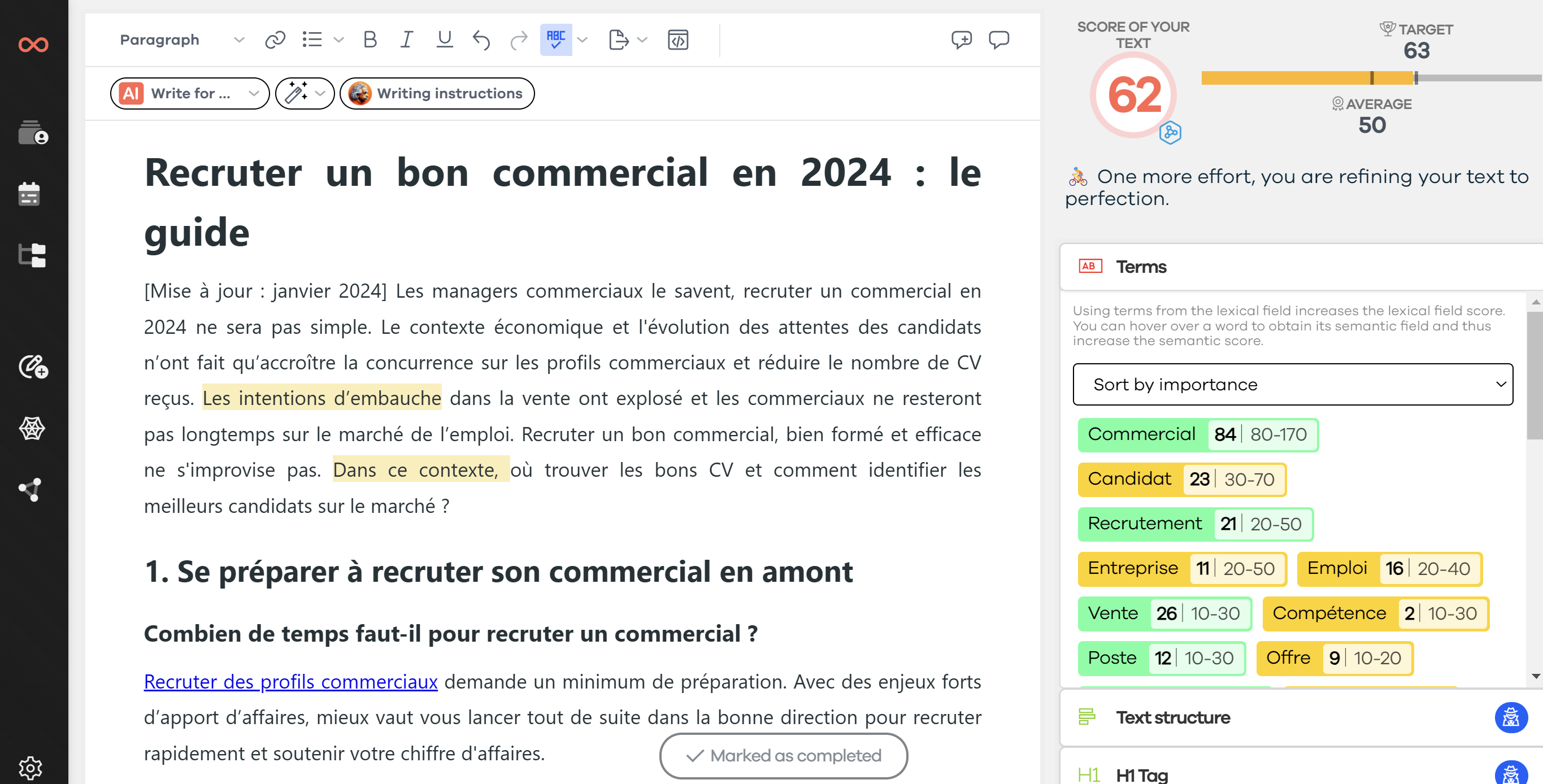Do you want your website to be visible on the Internet? To achieve this, you logically focus on organic search engine optimization. But did you know that you can't get there by rushing headlong?
Indeed, Google's algorithm adapts to different topics. What works for another subject than yours may not necessarily be the best option for your field. That's why you absolutely need to perform an SEO competitive analysis when you create or optimize your website!
I invite you to discover how to analyze your rivalry on the Web to achieve better organic search engine rankings than your competitors.
🕵️♂️ 6 steps to analyze your SEO competition
An effective SEO competition analysis must be done methodically. In fact, this work is usually carried out by an organic search engine optimization specialist. But to help you do it yourself, I'll provide you with all the essential steps to complete this task. You will be able to define your content marketing strategy in the long term and implement all the necessary measures to be visible on search engines.
1. Find your competitors on Google
To know your rivals in organic search engine optimization, the most logical step is simply to perform a search on Google. By entering several keywords related to your field of activity, you will quickly discover the sites that are most often highlighted.
However, be careful not to conduct overly general searches, as you may only find large brands or major resale sites (Amazon, Zalando, etc.). To illustrate this point, here are the organic results displayed when you search for the term "shoe."

On the other hand, if you favor long-tail or specific searches, you will quickly find your direct competitors. To use the same theme as before, here are the sites that naturally rank at the top of the SERP with the query "best trail shoe."

2. Study your rivals' keywords
Now that you've discovered your SEO competitors, you want to learn more about them. Your main goal, at first, is to identify the keywords that attract the most traffic.
To do this, you need to use analysis tools that will help you quickly understand the keywords your competitors rank well for. This way, you'll know which main queries to optimize for each page or blog post.
Here are the two tools I believe to be the most effective for this keyword analysis work. Their features are more or less similar. The choice, therefore, mainly lies in personal ease of use, needs, and pricing.
- SEMrush: The learning curve may seem a bit steep, but it's an excellent tool. It has many features and is one of the most widely used SEO software by professionals. The starting monthly rate is currently $119.95, with a 7-day trial period.
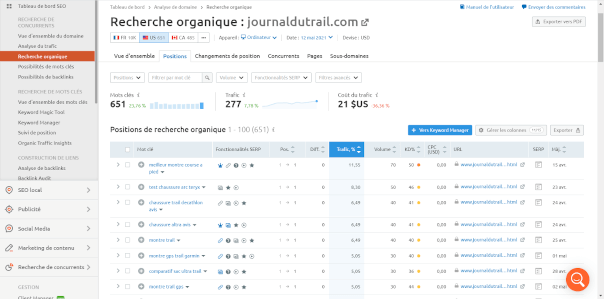
- Ranxplorer: Developed in France, this tool offers extremely accurate results. In addition to providing a detailed list of keywords, it allows (among other things) to compare traffic with your competition. The starting monthly rate is €9, including 10 analyzed sites and 100 keyword searches.
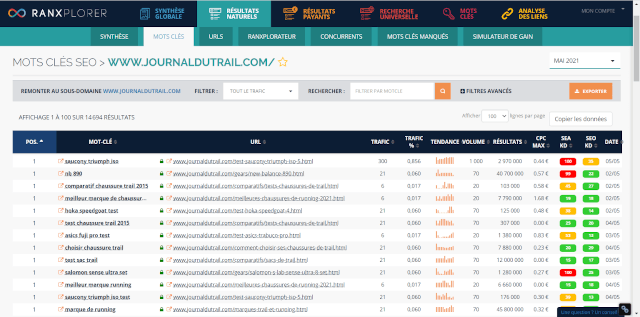
3. Dissect your competitors' websites
You know your SEO competitors and which keywords attract organic traffic. You can now analyze how their sites have been optimized to appear at the top of the SERP.
To do this, you mainly focus on the following optimization factors: what is the architecture of the sites, how have the user experience (UX) and technical aspects been addressed, and what is the quality of the content on the pages.
- Structure: You look at the tabs offered and how the internal linking has been established. Whether it's silos or topic clusters, you'll understand which pages are most important for creating or updating your site.
- Technical: Loading speed, popups, sitemap, CSS, etc. You compare the data obtained to set your parameters as efficiently as possible. During this step, user experience is also an essential point to analyze.
- Content: The most effective way to analyze the SEO content of your competitors is to use the SEOQuantum tool. Indeed, you will know exactly how many words to place in your text to outperform your rivals, how the content has been structured, the frequency of each keyword, and how to place them in the "hot zones" (especially the "Title" and "H1" tags).
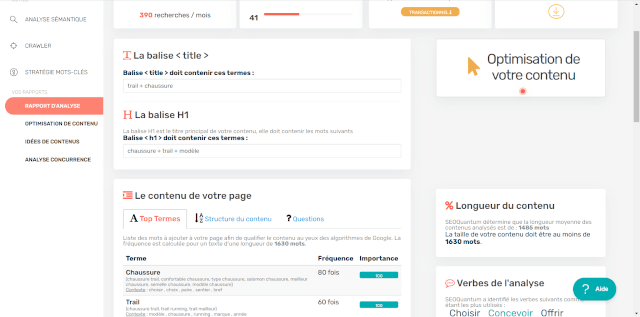
You can then draw inspiration from each of them, trying to reproduce what seems most coherent and best suited to you. Your goal is to take the best from each of your competitor's sites and adapt it to your own website.
4. Analyze the notoriety of your SEO competition
Knowing the authority score of your competitors in organic search engine optimization is crucial to establish an effective link building strategy. Indeed, to be able to place your site at the top of search engine results pages, you must carefully work on its notoriety.
At the same time, you can discover the origin of your SEO competitors' links, what are the link anchors, and which pages are targeted. All these elements are interesting to define an optimal backlinking campaign.
Two tools are widely recognized and used to analyze this type of data on any site. Once again, the choice of the program will depend on personal affinity and specific needs.
- Majestic: In the free version, you can already access the famous "Trust Flow," considered an extremely relevant value of a site's notoriety. With the paid version, you can understand the overall strategy of your rivals. Another advantage is that all the information is detailed in French. Easy to use, you can even install the Majestic Backlink Analyzer extension on Google Chrome.
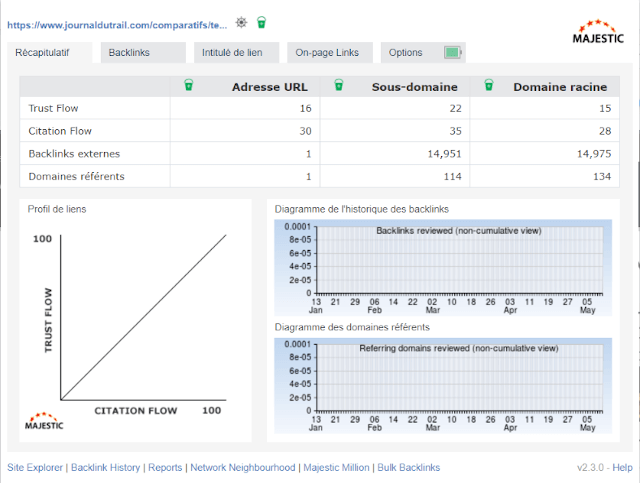
- Moz: The free version allows you to discover the "Domain Authority" of your competition, recognized as an excellent notoriety indicator. In addition, you have access to information such as targeted pages and referring domain names. The only downside is that all the information is in English. You can also download the Chrome extension MozBar for easy and quick access.
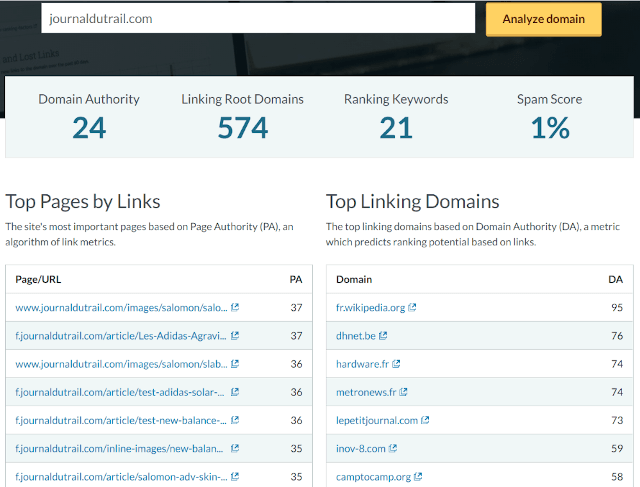
5. Discover your competitors' activity on social networks
Perhaps by talking about social media, we are stepping a bit outside the realm of SEO... or maybe not! The subject remains highly debated among SEO professionals.
However, what is certain is that by looking at what your competitors are doing on various social networks, you will better understand their communication strategy. You will be able to see which platforms to prioritize, what tone to adopt, and which publications are most popular.
At the same time, you will discover the influencers who could potentially support your online popularity. To perform an effective analysis, I strongly recommend using BuzzSumo (in English).
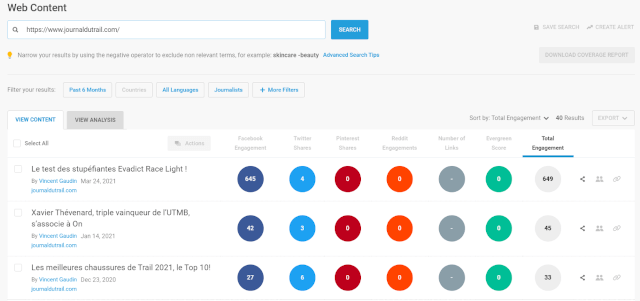
6. Monitor your competitors' evolution
Now you have analyzed your SEO competition in great detail. However, the work doesn't stop there. In reality, it never stops!
Continuous monitoring in organic search engine optimization is absolutely necessary for long-term success. Whether it's staying up-to-date with algorithm changes or knowing current trends, you must constantly stay informed.
The same goes for knowing the evolution of your rivals and their positioning on the most important keywords. To compare your traffic to that of your SEO competitors, the table provided by Ranxplorer is clear and precise.
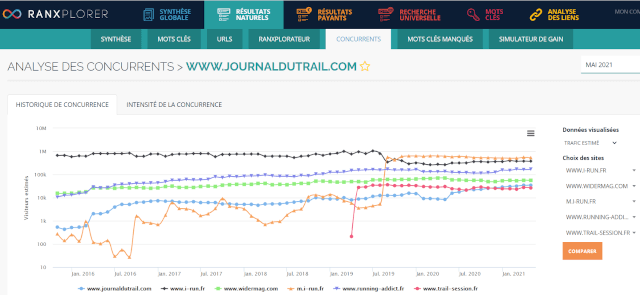
To analyze your evolution and that of your organic competition on the most important keywords, ranks.fr is an excellent monitoring tool.
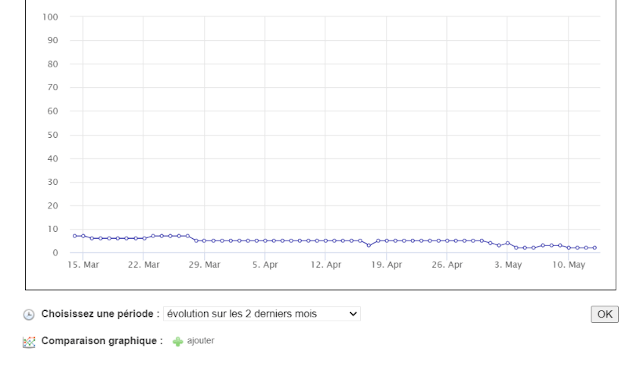
🥇 How to be better than your SEO competitors in the long term?
Once your competitive analysis is complete and the appropriate measures have been implemented, you want to maintain your superiority over your competitors. To achieve this, you will constantly monitor the evolution of search engine optimization based on your theme.
Conduct continuous monitoring

As previously described, you must imperatively stay informed about the evolution of organic search engine optimization best practices. In addition, you frequently observe your positioning on search engines, comparing it to that of your rivals. Finally, you constantly keep an eye on Google's search results pages to see if a new competitor appears.
Apply updates

Although this may seem obvious for an online store, this concept is often poorly applied to showcase sites. However, it is essential to frequently update the information you provide and the services you offer. This shows Google that your site is active and up-to-date, and you can constantly adapt its optimization based on the monitoring you perform.
Constantly develop your site's notoriety

A link building strategy is a long-term process. A massive influx of backlinks that is only temporary may send an alert message to search engines. Instead, spread your partnerships over the long term and constantly increase your notoriety to surpass all your direct competitors.
Regularly update a blog

To rank on numerous keywords and long-tail queries, the best way is to add a blog to your website. This way, you can energize your communication and significantly expand your visibility on the Web. You will stand out from your competition and be recognized as the undisputed specialist in your field.
❓ Frequently asked questions for a good SEO competition analysis
Why perform an SEO competitive analysis?
Not performing an SEO competitive analysis means moving blindly, taking risks, and wasting time. To have a chance to rank your site well on search engines, you need to know what they like. You also need to know the most important keywords and understand users' search intent. For all these reasons, it is essential to analyze your competitors in great detail.
What are the steps to analyze your competition on Google?
As described in this post, I believe there are 6 steps to follow to analyze your SEO competition and succeed in standing out:
-
identify your competition;
-
study important keywords;
-
analyze competitor sites;
-
know the notoriety of your competition;
-
know what your rivals publish on social networks;
-
follow the evolution of organic search engine optimization.
What are the best tools for conducting an SEO competition analysis?
In this article, I have suggested numerous examples of tools to perform a comprehensive competitive analysis. If I had to select only one per theme, here are the ones I couldn't do without:
- Google: to find your SEO competition;
- Ranxplorer: to know the keywords to work on;
- SEOQuantum: to write better content than your competitors;
- Majestic: to understand the notoriety of your rivals;
- BuzzSumo: to know what's happening on social networks;
- Ranks: to analyze the evolution of positioning on search engines.
If you want to know all the necessary tools for optimal digital communication, don't hesitate to discover my article dedicated to content marketing tools.
🎬 Conclusion
Don't take this task lightly and don't hesitate to ask for help from a specialist if you don't think you have the skills to do it perfectly. Remember that if you don't properly analyze your online rivals, you will waste time and money.
Thanks to this in-depth examination and the appropriate measures taken, your site will be the best, and Google will have no choice but to favor it. Do you want your content to surpass all your competitors? Discover the different features of our tool without further delay and boost your organic traffic!
Need to go further?
If you need to delve deeper into the topic, the editorial team recommends the following 5 contents:

